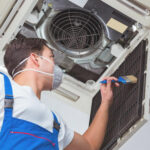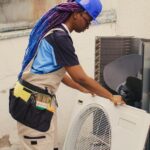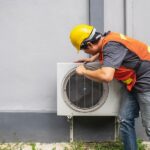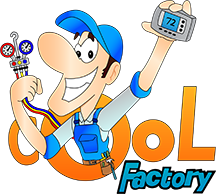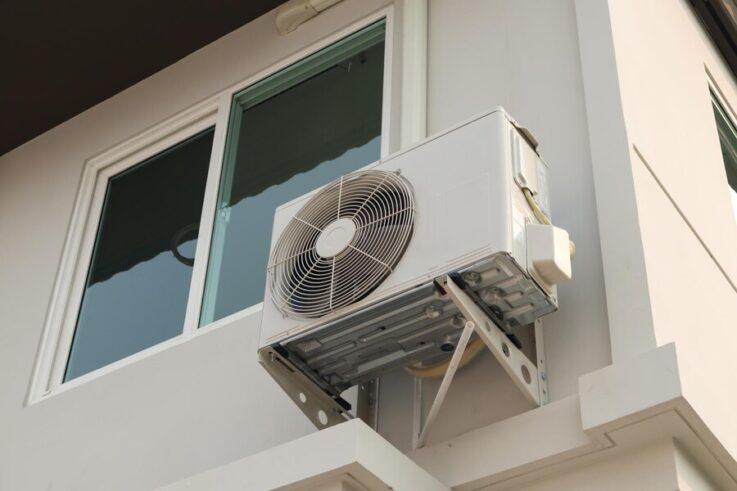
How to Keep Your HVAC System Running Efficiently
How to Keep Your HVAC System Running Efficiently
Keeping your HVAC system running efficiently is crucial for maintaining a comfortable indoor environment while also saving on energy costs. From ensuring proper maintenance to making smart usage decisions, there are several strategies homeowners can employ to maximize the efficiency of their heating, ventilation, and air conditioning systems. In this blog, we’ll explore practical tips and techniques to help you keep your HVAC system running smoothly, effectively enhancing both your comfort and your savings.
Why HVAC Efficiency Matters
Efficient HVAC systems play a vital role in ensuring comfort and maintaining indoor air quality while also contributing to significant energy savings. When your HVAC system operates efficiently, it consumes less energy to provide the desired heating or cooling, resulting in lower utility bills and reduced environmental impact.
Moreover, an efficient system operates more quietly and effectively distributes air throughout your home, enhancing overall comfort levels. By prioritizing efficiency, homeowners can enjoy a more sustainable and cost-effective solution for their heating and cooling needs, ultimately improving both their quality of life and their financial well-being.
The Importance of Regular Maintenance
Regular maintenance is the cornerstone of preserving HVAC system efficiency and longevity. Through routine inspections and servicing, potential issues can be identified and addressed promptly, preventing more significant problems from arising later on. Tasks such as cleaning or replacing air filters, checking for leaks, and lubricating moving parts ensure that the system operates smoothly and efficiently.
Additionally, maintenance visits provide an opportunity for HVAC professionals to optimize system settings and recommend any necessary upgrades or improvements to further enhance efficiency. Ultimately, regular maintenance not only extends the lifespan of your HVAC system but also ensures consistent performance and energy savings over time.
Efficient HVAC System Components
An efficient HVAC system comprises various components working harmoniously to deliver optimal performance while minimizing energy consumption. High-efficiency furnaces, air conditioners, and heat pumps utilize advanced technologies such as variable-speed motors and two-stage compressors to modulate energy usage based on demand. Additionally, properly sized and insulated ductwork ensures efficient airflow throughout the home, reducing energy losses.
Advanced air filtration systems improve indoor air quality without compromising efficiency, while programmable thermostats allow precise control over temperature settings, further enhancing overall system efficiency. By investing in these efficient components, homeowners can enjoy superior comfort and substantial energy savings year-round.
Energy-Saving Thermostat Settings
Setting your thermostat to energy-saving temperatures can significantly reduce your HVAC system’s energy consumption without sacrificing comfort. During colder months, lowering the thermostat by a few degrees while you’re asleep or away from home can lead to substantial energy savings. In warmer seasons, raising the thermostat setting can achieve similar results.
Programmable thermostats offer the convenience of automatically adjusting temperatures according to your schedule, optimizing energy usage throughout the day. Additionally, utilizing features like “smart” thermostats, which learn your preferences and adjust settings accordingly, further enhances energy efficiency. By adopting energy-saving thermostat settings, homeowners can effortlessly reduce their energy bills while maintaining comfort levels.
Effective Air Filter Replacement
Regular air filter replacement is essential for maintaining the efficiency and performance of your HVAC system. Over time, air filters become clogged with dust, dirt, and other airborne particles, restricting airflow and causing the system to work harder to maintain desired temperatures. By replacing air filters according to manufacturer recommendations, typically every 1 to 3 months, you ensure optimal airflow and air quality while minimizing strain on the system.
High-efficiency air filters can trap smaller particles, further improving indoor air quality and reducing the risk of respiratory issues. Making air filter replacement a priority is a simple yet effective way to optimize HVAC system efficiency and longevity.
Ductwork Inspection and Sealing
The integrity of your ductwork significantly impacts the efficiency of your HVAC system. Leaks, gaps, and poor insulation in ductwork can lead to significant energy losses as conditioned air escapes into unconditioned spaces like attics, basements, or crawl spaces. Regular ductwork inspection and sealing are crucial for identifying and addressing these issues. HVAC professionals use specialized tools like pressure tests and thermal imaging to detect leaks and inefficiencies in ductwork.
Sealing ducts with mastic or foil tape and insulating them properly can prevent air leakage and improve airflow, thereby enhancing overall system efficiency and reducing energy costs. Prioritizing ductwork inspection and sealing helps homeowners maximize the performance and efficiency of their HVAC systems while ensuring consistent comfort throughout their homes.
Optimizing Airflow for Efficiency
Proper airflow is essential for maximizing the efficiency of your HVAC system. Blocked or obstructed vents can restrict airflow, causing uneven heating or cooling and putting unnecessary strain on the system. Ensure all vents and registers are free from obstruction and open to allow for optimal airflow throughout your home. Additionally, regular cleaning of vents and ductwork removes dust and debris that can impede airflow and reduce efficiency.
Balancing airflow by adjusting dampers or registers ensures consistent temperatures in every room while minimizing energy consumption. By optimizing airflow, you can improve the efficiency and performance of your HVAC system, leading to increased comfort and energy savings.
Investing in Programmable Thermostats
Programmable thermostats offer convenience and energy savings by allowing you to set different temperature schedules based on your daily routines. By programming the thermostat to automatically adjust temperatures when you’re asleep or away from home, you can reduce energy consumption without sacrificing comfort. Many programmable thermostats also offer features such as Wi-Fi connectivity, allowing you to control your HVAC system remotely via smartphone apps or voice commands.
This flexibility enables you to fine-tune your heating and cooling settings for maximum efficiency and comfort. Investing in a programmable thermostat is a smart decision that can lead to significant energy savings and enhanced control over your home’s climate.
Proper Insulation for Energy Efficiency
Effective insulation is vital for energy-efficient homes, creating a barrier against heat transfer and maintaining stable indoor temperatures. Insulating key areas like walls, floors, and attics minimizes heat loss in winter and heat gain in summer, easing the burden on HVAC systems. This results in consistent comfort levels throughout the year while reducing energy bills.
Choosing high-quality insulation materials and ensuring proper installation are essential steps toward maximizing efficiency and sustainability. By investing in effective insulation, homeowners not only enhance their living environment but also contribute to a greener future by reducing energy consumption and greenhouse gas emissions.
Benefits of Routine HVAC Tune-Ups
Routine HVAC tune-ups are essential for ensuring the continued efficiency and reliability of your heating and cooling systems. During a tune-up, HVAC professionals inspect and clean components, identify potential issues, and perform necessary adjustments to optimize performance. By addressing minor problems before they escalate, routine tune-ups can prevent costly repairs and extend the lifespan of your HVAC equipment.
Additionally, a well-maintained system operates more efficiently, resulting in lower energy bills and improved indoor comfort. Investing in regular HVAC tune-ups offers peace of mind, reduces energy costs, and enhances the overall performance of your heating and cooling systems.
Identifying and Fixing Leaks
Identifying and fixing air leaks in your home is crucial for improving energy efficiency and reducing heating and cooling costs. Common sources of air leaks include windows, doors, electrical outlets, and gaps in walls or ductwork. By conducting a thorough inspection and sealing any leaks with caulk, weatherstripping, or foam insulation, homeowners can prevent conditioned air from escaping and outside air from infiltrating their homes.
Proper sealing of leaks not only enhances energy efficiency but also improves indoor air quality and comfort. Taking the time to identify and fix leaks is a cost-effective way to boost energy savings and create a more comfortable living environment.
Utilizing Ceiling Fans for Efficiency
Ceiling fans are valuable tools for improving energy efficiency and comfort in your home. In warmer months, running ceiling fans in conjunction with your air conditioning system can help distribute cooled air more effectively, allowing you to set your thermostat higher and reduce energy consumption.
In colder months, reversing the direction of ceiling fan blades creates an updraft that helps circulate warm air trapped near the ceiling, reducing the workload on your heating system. By utilizing ceiling fans strategically throughout the year, homeowners can enhance HVAC efficiency, save on energy costs, and enjoy more consistent indoor temperatures.
Long-Term Savings through Efficiency
Investing in energy-efficient upgrades and practices offers significant long-term savings for homeowners. From upgrading to high-efficiency HVAC equipment and appliances to implementing energy-saving measures like proper insulation and sealing leaks, every step towards efficiency contributes to reduced energy consumption and lower utility bills over time.
Additionally, energy-efficient homes tend to have higher resale values and attract environmentally conscious buyers. By prioritizing efficiency and making smart choices about energy usage, homeowners can enjoy ongoing savings, increased comfort, and a reduced environmental footprint for years to come.
Maintaining the efficiency of your HVAC system is crucial for both comfort and cost savings. By implementing the strategies outlined in this guide, you can ensure optimal performance while minimizing energy consumption. Whether it’s scheduling regular maintenance, investing in programmable thermostats, or addressing air leaks, every step you take contributes to a more efficient and sustainable home environment.
If you need professional assistance or further guidance in optimizing your HVAC system, don’t hesitate to contact Cool Factory, Inc. Our team of experts in Sterling, VA, is ready to help. Call us at (703) 713-5113 to schedule a consultation and take the next step toward a more efficient HVAC system.



